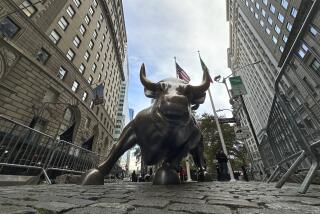Wall Street climbs ahead of a big week for Big Tech as oil drops 6%

NEW YORK — U.S. stocks rose Monday as gains for Big Tech made up for slides in oil-and-gas stocks after the price of crude tumbled sharply.
The Standard & Poor’s 500 rose 0.3%, while the Dow Jones industrial average gained 0.6% and the Nasdaq composite rose 0.3% to approach its all-time high set in July.
Several Big Tech stocks helped lead the way, and five of the behemoths known as the “Magnificent Seven” are on this week’s schedule to report their latest profits. These high-flying stocks have been at the forefront of Wall Street for years and have grown so big that their movements can single-handedly shift the S&P 500.
After suffering a summertime swoon on worries that their stock prices had risen too quickly when compared with their profits, Alphabet, Meta Platforms, Microsoft, Apple and Amazon are under pressure to deliver more big growth.
Another member of the Magnificent Seven, Tesla, soared to one of the best days in its history last week after reporting a better profit than analysts expected.
Monday’s gains for Big Tech helped offset drops for stocks in the oil-and-gas industry, which were hurt by the sinking price of oil. Exxon Mobil’s 0.6% drop and ConocoPhillips’ slide of 1.5% were two of the heaviest weights on the S&P 500.
A barrel of benchmark U.S. crude fell 6.1%, and Brent crude, the international standard, slid 5.9%. It was the first trading day for them since Israel attacked Iranian military targets Saturday in retaliation for an earlier barrage of ballistic missiles. Israel’s attack was more restrained than some investors had feared it could be, and it raised hopes that a worst-case scenario may be avoided.
Beyond the violence that is taking a human toll, the worry in financial markets is that an escalating war in the Middle East could cut off the flow of crude from Iran, which is a major oil producer. Such worries had sent the price of Brent crude up to nearly $81 per barrel in early October, despite signals that plenty of oil is available for the global economy. It has since fallen back below $72.
Financial markets are also dealing with the volatility that typically surrounds a U.S. presidential election, with election day fast approaching in two Tuesdays. Markets have historically been shaky heading into an election, only to calm afterward regardless of which party wins.
The trend affects both the stock and the bond markets. In the bond market, Treasury yields were ticking higher to tack more gains onto their sharp rise for the month so far.
The yield on the 10-year Treasury rose to 4.29% from 4.24% late Friday. That’s well above the roughly 3.70% level where it was near the start of October.
Yields have climbed as report after report has shown the U.S. economy remains stronger than expected. That’s good news for Wall Street, because it bolsters hopes the economy can escape from the worst inflation in generations without the painful recession that many had worried was inevitable.
But it’s also forcing traders to ratchet back forecasts for how deeply the Federal Reserve will cut interest rates, now that it’s just as focused on keeping the economy humming as getting inflation lower. With bets diminishing on how much the Fed will ultimately cut rates, Treasury yields have also been given back some of their earlier declines.
That means the U.S. jobs report on the schedule for Friday could end up being the market’s main event, even bigger than the Big Tech profit reports. Investors want to see more evidence of solid hiring to keep alive the perfect-landing hopes for the economy.
Such data have supplanted inflation reports, which used to be the most important for Wall Street every month but have waned as inflation seems to be heading toward the Fed’s target of 2%.
Yields have also climbed as investors have seen former President Trump’s chances of reelection improving. Economists say a Trump win could help push inflation higher in the long term, and worsening inflation could push the Fed to hike interest rates.
Trump Media & Technology Group, the company that tends to move more with Trump’s reelection odds than on its own profit prospects, jumped 18.9% Monday to $46.27. The parent company of Trump’s Truth Social platform has been rallying since hitting a bottom of roughly $12 in late September, though it’s still well below its perch above $60 reached in March.
Robinhood Markets rose 3.3% after it said it would begin allowing some of its customers to trade contracts based on whether they think either Trump or Vice President Kamala Harris will win the 2024 election.
Delta Air Lines was another winner and rose 3.1% after suing CrowdStrike, claiming the cybersecurity company had cut corners and caused a worldwide technology outage that led to thousands of canceled flight in July.
In stock markets abroad, Japan’s Nikkei 225 rose 1.8% as the value of the Japanese yen sank after Japanese Prime Minister Shigeru Ishiba’ s ruling coalition lost a majority in the 465-seat lower house in a parliamentary election Sunday.
Stock indexes were mostly higher across much of the rest of Asia and in Europe.
Choe writes for the Associated Press. AP writers Yuri Kageyama and Matt Ott contributed to this report.
More to Read
Inside the business of entertainment
The Wide Shot brings you news, analysis and insights on everything from streaming wars to production — and what it all means for the future.
You may occasionally receive promotional content from the Los Angeles Times.










